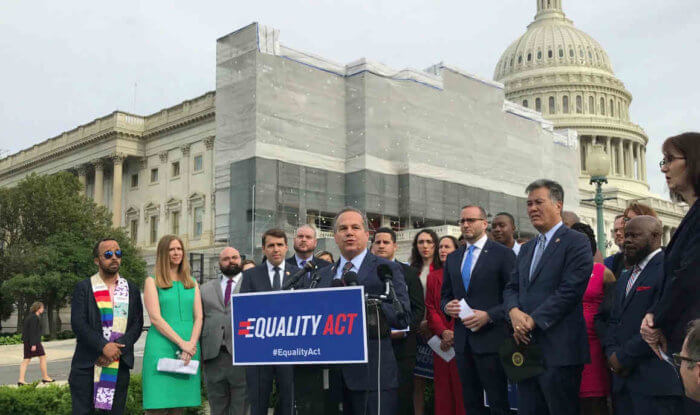Lawmakers in the Senate on February 23 introduced the Equality Act, a comprehensive bill that would amend the 1964 Civil Rights Act and related federal laws to ban discrimination against LGBTQ individuals.
The legislation, introduced in the House February 18, would firmly establish comprehensive protections in areas including housing, employment, public education, public accommodations, federal funding, credit, and the jury system and expand on the Supreme Court ruling issued in June of last year. The latest version of the bill, most recently passed the lower chamber in 2019, comes weeks after President Joe Biden issued executive orders earlier this year reaffirming and broadening protections for queer people.
The bill is expected to easily pass the House of Representatives — and a vote is expected within days — but it faces significant hurdles in a divided Senate. Conservative Senator Joe Manchin of West Virginia and out bisexual Arizona Senator Kyrsten Sinema, both Democrats, are among those who have voiced opposition to scrapping the filibuster, which requires 60 votes to overcome in a Senate that is split 50-50. Even if that hurdle is cleared, it is possible that the Equality Act would not even attract support from enough senators. Manchin has stood in opposition to the bill and it is not clear whether Republicans such as Republican Senator Susan Collins of Maine — who voted in favor of the Employment Non-Discrimination Act — would vote in favor of the legislation. She told the Washington Blade she would not be co-sponsoring it because she believes “certain provisions of the Equality Act which needed revision.”
Senator Jeff Merkley of Oregon, the bill’s lead sponsor in the upper chamber, explained that the bill is necessary because it impacts some of the most basic functions of life for LGBTQ Americans.
“All of us go to work and school, go home, and go shopping, and none of us should have to keep our families hidden or pretend to be someone we’re not to do those things,” Merkley said in a written statement. “True freedom is the ability to participate fully in every aspect of American life, without fear. I authored the #EqualityAct so we can fully open the doors of opportunity for everyone in our country.”
Out lesbian Senator Tammy Baldwin of Wisconsin, a co-sponsor of the bill, emphasized the far-reaching impact the legislation would have across the United States.
“It is just wrong that in a majority of states, LGBTQ Americans live without fully-inclusive non-discrimination laws and can still face discrimination simply because of who they are or who they love,” Baldwin stated. “It is time to end this kind of discrimination because LGBTQ Americans should have the freedom of full equality. I know the House will do its job to pass the Equality Act and the Senate should do the same and get the job done so that we provide full equality for every LGBTQ American across our country.”
Speaker Nancy Pelosi of California said lawmakers in the House of Representatives would move quickly to push the bill forward — and a vote is expected in the lower chamber in a matter of days.
“The Democratic House will now swiftly pass this landmark legislation and will keep working until it is finally enacted into law – so that we can combat anti-LGBTQ discrimination that undermines our democracy and advance justice in America,” Pelosi said after the bill was introduced in the lower chamber.

Out gay Representative David Cicilline of Rhode Island, who is the lead sponsor in the lower house, urged his colleagues to join him in moving the legislation forward.
“In 2021, every American should be treated with respect and dignity,” Cicilline said in a written statement after the bill was introduced. “Yet, in most states, LGBTQ people can be discriminated against because of who they are, or who they love. It is past time for that to change. I’m proud to introduce the Equality Act today, and I look forward to continuing to work with Senator Merkley to get this bill signed into law.”
Since the bill was introduced in the House, queer legal groups praised lawmakers for introducing the legislation. Lambda Legal CEO Kevin Jennings described the Equality Act as “long past-due federal legislation.”
“LGBTQ people across the country remain vulnerable to discrimination on a daily basis and too often have little recourse,” Jennings said. “Without comprehensive federal protections, the basic rights of LGBTQ people vary state to state. In some instances, individuals lose rights and protections the moment they cross the border into a neighboring state, underscoring that the current patchwork of protections for LGBTQ people is inadequate. In addition, as evidenced by the thousands of phone calls to our Help Desk we receive each year, many employers, landlords and lenders still haven’t gotten the message that discrimination is just wrong, which is why we need the absolute clarity of the Equality Act, and we need it now.”
GLBTQ Legal Advocates and Defenders executive director Janson Wu underscored the dire need to move forward with the legislation to ensure comprehensive protections for queer Americans.
“The Equality Act is vital to ensuring the promise of a level playing field for all Americans,” Wu said in a written statement. “Passing the Equality Act is a critical step toward ensuring that LGBTQ people — and all people — can protect their families and contribute to their communities and workplaces. It also ensures the fairness and dignity all Americans need and deserve. We call on Congress to follow the lead of the American people and send the Equality Act to President Biden for his signature this session.”
Imani Rupert-Gordon, the director of the National Center for Lesbian Rights, said the new legislation “starts to carve a clear path to LGBTQ equality and marks a new day for our country.”
“The harsh reality is that current anti-discrimination protections fall far short of protecting everyone in our communities, leaving behind LGBTQ people and people of color who continue to face disproportionate discrimination in nearly every aspect of their lives,” Rupert-Gordon stated. “The Equality Act builds on the important legacy of the Civil Rights Act of 1964 and would provide nondiscrimination protections that include LGBTQ people for the very first time, while also extending protections to the most underrepresented in our communities in housing, healthcare, education, and other vital parts of everyday life.”
Athlete Ally, which has been a leading defender of the rights of transgender student-athletes in the face of fiercely transphobic campaigns to sideline trans athletes, also reacted after the bill was proposed.
“We applaud the reintroduction of the Equality Act in Congress, and hope to see support across chambers for LGBTQ+ Americans to live free from discrimination,” Hudson Taylor, founder and executive director of Athlete Ally, said in a written statement. “From the workplace to the classroom, locker room and playing field, LGBTQ+ Americans deserve to be fully who they are and afforded the same rights and access as anyone else. This is a pivotal moment for equality and inclusion, and we hope to see the Equality Act signed into law.”
When the bill passed the House of Representatives in 2019, 236 lawmakers voted in favor of it — including eight Republicans — and that was the first time the bill passed either chamber since it was introduced in its modern-day form in 2015.




































